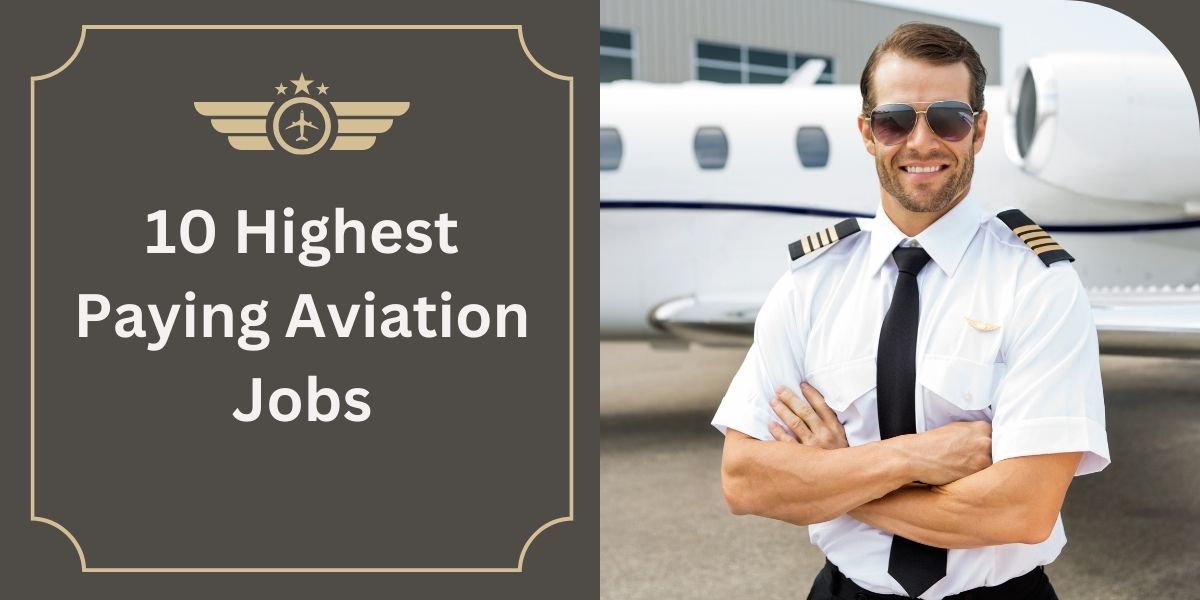The aviation industry is fast evolving, and questions have been asked regarding the highest-paying aviation jobs. Embarking on a career in aviation fulfills a passion for flight and also holds the potential for lucrative financial rewards.
In the aviation field, the requirements for jobs vary widely, with opportunities for pilots, flight attendants, mechanics and engineers, security guards, and more.
In this article, we will discuss the top 10 highest-paying aviation jobs and provide information on the salary range, primary duties, and roles for each position.
Why work in the aviation industry?
The aviation industry is growing every year, providing opportunities for employment and professional growth in a variety of roles.
Many jobs in aviation will allow you to travel the world, meet interesting people, and become an integral part of flight safety and design.
Other positions remain local to one area, which can be beneficial if you have family or other obligations that prevent you from traveling.
Top 10 Highest Paying Aviation Jobs in 2025
1. Aerospace engineer
Average salary: $102,364 per year
Primary duties: An aerospace engineer designs new aircraft and space vehicles.
Typical job duties include designing aircraft parts and equipment, creating detailed specifications for aircraft design, creating drawings of aircraft using CAD/CAM, ensuring that all parts and aircraft meet safety and regulatory requirements, conducting system tests, troubleshooting issues, and modifying problematic systems and designs.
2. Flight Instructor
Average salary: $95,174 per year
Primary duties: Flight instructors will be one of the highest-paying aviation jobs in 2024. They teach people how to fly airplanes, helicopters, and other aircraft.
These instructors provide detailed instruction via on-the-ground classes, in simulators, or during live flights. They may also examine students for proficiency and help them prepare for the pilot’s license test required by the Federal Aviation Administration.
3. Avionics engineer
Average salary: $94,593 per year
Primary duties: An avionics engineer researches and solves problems with aviation electronics. They may work on landing systems, communications equipment, safety instrumentation, navigation, and flight-control systems.
Their other job duties include conducting system inspections and testing and repairing faulty systems. They may also be responsible for calibrating the aircraft crew’s communications frequencies to communicate with other pilots and ground personnel in aviation jobs.
4. Flight test engineer
Average salary: $83,266 per year
Primary duties: Flight test engineers are high-paying aviation jobs. They are responsible for testing the performance and operations of aircraft to ensure that they comply with all Federal Aviation Administration guidelines and regulations.
However, they plan, coordinate, and conduct tests on all parts of an aircraft, troubleshoot issues, and prepare detailed testing documentation.
5. Aircraft mechanic
Average salary: $69,495 per year
Primary duties: Aircraft mechanics must inspect, maintain, and repair aircraft according to Federal Aviation Administration guidelines.
Typical job duties also include repairing sheet metal, inspecting the plane tail and wings for damage or corrosion, replacing or repairing broken parts, maintaining engines, and working with detailed aircraft blueprints.
6. Aviation manager
Average salary: $62,863 per year
Primary duties: In aviation jobs, an aviation manager is responsible for all day-to-day operations at an airport or airline.
They maintain airplane maintenance records, monitor inspection schedules, ensure their employer complies with all Federal Aviation Administration regulations, and work with emergency responders and prep flight crews. They also manage the staff and create work schedules.
7. Aircraft maintenance technician
Average salary: $48,866 per year
Primary duties: Aircraft maintenance technicians are high-paying aviation jobs. They repair and perform maintenance on airplanes, helicopters, and other aircraft.
Typical job duties include inspecting aircraft parts for defects, diagnosing mechanical issues, measuring critical parts for wear, repairing or replacing broken parts, and keeping detailed records of all work done on an aircraft.
8. Air traffic controller
Average salary: $46,114 per year
Primary duties: An air traffic controller monitors the air traffic within a particular air space. They also instruct pilots on landing and takeoff procedures, analyze weather forecasts, and determine air routes for pilots.
Additional duties include organizing searches for missing airplanes, controlling airport lighting, and monitoring all communications in and out of the flight tower.
9. Pilot
Average salary: $43,950 per year
Primary duties: Pilots are high-paying aviation jobs. They are responsible for flying and navigating helicopters, airplanes, and other kinds of aircraft. They may transport passengers and cargo, dust crops, operate sightseeing tours, and assist in rescue and firefighting operations.
Pilots must perform pre- and post-flight inspections, keep accurate flight records, communicate with air agencies and tower personnel, and ensure the safety of all passengers and crew on board.
10. Cargo agent
Average salary: $42,884 per year
Primary duties: In aviation jobs, a cargo agent is responsible for moving goods through the airline.
They must ensure that packages are delivered and picked up in a timely fashion, complete all necessary paperwork, and collect delivery fees. International cargo agents must also complete and inspect all customs and tariff paperwork.
What skills are required for jobs in aviation?
Here is a list of some relevant skills required for the highest-paying jobs in the aviation industry.
- Pleasant and friendly personality
- Agility and a good sense of balance
- Good health and physical fitness
- Clear speech and voice
- Presence of mind
- Team worker
- Presence of mind
- Punctuality
- Patience
- Politeness
Conclusion
As the aviation industry continues to evolve, the demand for skilled professionals in these highest-paying jobs increases.
In an ever-competitive job market, the insights provided here offer a strategic advantage, guiding individuals toward fulfilling and financially rewarding careers in the aviation industry.
However, there is more to life in the aviation industry than just flying. Working in an airport can be an exciting experience where you encounter interesting people and see a surprising slice of life each day.




 Jobi.ng
Jobi.ng




